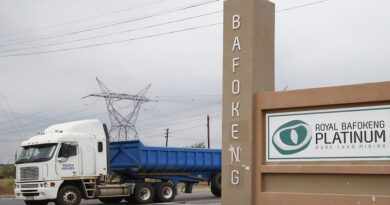Fake news could jeopardise SA vaccine rollout
As South Africa prepares to receive its first batches of the Covid-19 vaccine, scepticism and misinformation regarding the jabs is rife.
During a webinar on debunking myths around the Covid-19 vaccine on Wednesday, University of KwaZulu-Natal head of Virology Dr Nokukhanya Msomi said one of the most common myths is that the vaccine was developed to control the general population through microchip tracking.
Another commonly-held myth, according to Msomi, is that the vaccine will alter a person’s DNA.
As the country prepares to implement a mass vaccination programme later this month, beginning with healthcare workers, the uptake rate could be jeopardised by the spread of such misinformation.
Misinformation around the vaccine has been cited by experts as one of the biggest culprits of distrust of vaccines among South Africans.
SA’s chief justice singled out
It also does not help that prominent South Africans have publicly “cast aspersions” on the efficacy of vaccines – such as Chief Justice Mogoeng Mogoeng, who called for any vaccine with “666” to be destroyed.
In a complaint laid with the Judicial Service Commission against Mogoeng on Wednesday, civil society organisation The African Alliance says Mogoeng’s utterances have no basis in science and have the potential to cause “widespread confusion, and fear about the safety of vaccines generally and the Covid-19 vaccine, in particular….”
The organisation says given Mogoeng’s prominent position, his remarks could directly jeopardise the Covid-19 vaccine roll out in South Africa.
Mogoeng’s remarks “may cause people to doubt the safety of the Covid-19 vaccine despite it having an acceptable safety profile” the complaint reads. “In turn, this may make it easier for people to deceive and/or spread false information about the Covid-19 vaccine.”
Sentiment
Despite dealing with the second wave of the pandemic and President Cyril Ramaphosa stating on Monday (January 11) that the country had already recorded 190 000 new infections so far this year, surveys asking people if they would be willing to get a Covid-19 vaccine are returning dispiriting results.
According to data from fintech company CompariSure, a staggering 52% of South Africans surveyed will not take the Covid-19 vaccine if it is made available to them.
CompariSure chief financial officer Matt Kloos says the Covid-19 vaccine has proved to be a “polarising” issue over the last couple of months, as governments across the world begin rolling out their vaccination programmes.
When asked why they were unwilling to receive the vaccine, 34% of respondents cited “side effects” as their main concern. Other reasons for rejecting the jab included “religion” (13%) and “cost/price” (16%), with approximately 40% of those surveyed stating “other” and supplying reasons such as “fear of needles” and “government tracking”.
A survey conducted by technology company M4Jam found that 84% of respondents plan to reject the vaccine. Of 3 000 people surveyed, only 9% believe treatments for the virus have improved since Covid-19 hit the country’s shores in March last year.
Listen: Georgie Midgley, CEO of M4Jam, shares findings from its Covid-19 vaccine survey
Some want to wait and see
When asked if they would take the vaccine when it becomes available in SA, only 32% said yes, while 58% said they would prefer to wait and see whether it works for others and 10% said they would refuse to take it.
Half of the respondents cited lack of trust in the government to ensure the safety of the vaccine and its effectiveness, while 39% said they fear contracting the virus from the vaccine itself.
M4Jam CEO Georgie Midgley says the spread of misinformation regarding the Covid-19 vaccine illustrates the need for an extensive communication campaign.
Health Minister Zweli Mkhize earlier this month said South Africa had made a deal with the Serum Institute of India and will be getting an initial 1.5 million doses of AstraZeneca vaccine for its health workers starting this month.
The country is also is talks with other vaccine manufactures in Russia and China to procure vaccines.
In the meantime, a mass public communication campaign regarding the Covid-19 vaccine has been rolled out by the government in a bid to counteract the spread of misinformation.
The Solidarity Fund began rolling out its own public campaign last year to encourage behavioural changes to combat the spread of the deadly virus, including sanitising of hands, wearing masks and avoiding public gatherings.
A Solidarity Fund spokesperson told Moneyweb the fund is “exploring how it can support the government’s efforts in the rollout of a comprehensive vaccine programme for the country, including integrating this messaging into its wide-ranging behavioural change campaign.”
Listen to Dudu Ramela’s interview with Profmed CEO Craig Comrie:
Source: moneyweb.co.za


